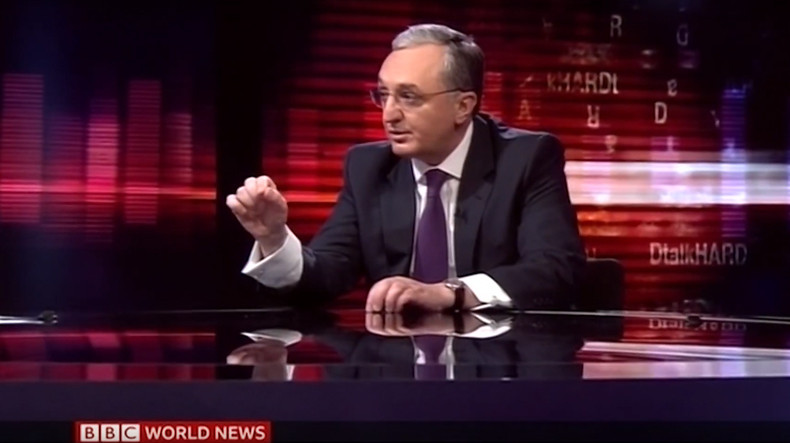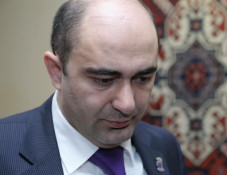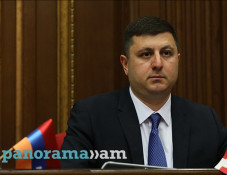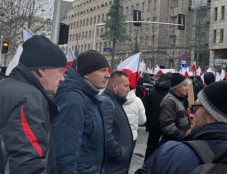
We have not been detracting from the peace process in any way – Zohrab Mnatsakanyan
Armenia’s Foreign Minister Zohrab Mnatsakanyan gave interview to to BBC HardTalk’s Stephen Sackur. Panorama.am present the interview in its entirety, as released by the press service of the ministry of foreign affairs.
Stephen Sackur: Welcome to Hard Talk: I’m Stephen Sackur. Armenia is a small state with outsized strategic significance, in the Caucasus region, beset with tension and hostility. Last year, popular protests delivered a so-called Velvet Revolution, which saw a new government installed in Yerevan. In an ambitious talk of reform, my guest is the Foreign Minister in that government, Zohrab Mnatsakanyan. Is Armenia looking East or West for political and economic inspiration? Zohrab Mnatsakanyan, welcome to Hard Talk.
Zohrab Mnatsakanyan: Thank you.
Stephen Sackur: Last year saw major political upheaval in your country - Armenia, the so-called Velvet Revolution, after which You and Your government claimed, that you were working for a new Armenia. Sceptics will say that it’s very much like the old Armenia. So, what’s
different?
Zohrab Mnatsakanyan: Why would they say that?
Stephen Sackur: Because, for example, You, were an official for many years under previous regimes. You are a man of great governmental experience, you know, you aren’t new at all.
Zohrab Mnatsakanyan: I’ve made a choice of my own, I’ve made a choice to move from diplomatic career to politics. That’s the major change. I took out the responsibility to share with the government, in which I am, and this is a major change. The government has received a huge mandate from the people, from the public, as a result of the Revolution we have reached. The government has reacted to those popular demands, and received solid mandate, to deliver the change. And we have demonstrated the very strong part of political will, in which with political will you can deliver very quickly results, which were stemmed from the popular demand, and those concerned corruption, those concerned fair equal opportunities for all in social and economic life those concerned the fair elections and the biggest challenge we have to deal, is the judicial reform. Those are the various issues. It’s only just a shortlist of various other issues that the government has been addressing.
Stephen Sackur: And you claim, that work has been done very quickly. But we have your Justice minister, just the other day, Mr Badasyan, announcing that the new agency to discover and investigate corruption crimes, the so-called Anti-corruption committee, won't be operational until 2021…
Zohrab Mnatsakanyan: Absolutely, you know, that’s what I was telling about the power of political will. We absolutely understand that with political will you can deliver results, but that is not sufficient. You have to institutionally consolidate the system, which can react to those phenomena.
Stephen Sackur: Does it take two years to set up a committee.
Zohrab Mnatsakanyan: No, no, this is something rather complicated, and more complex. You are working on institutional capacity to address the phenomenon of corruption. And that is something more serious. And, in fact, we are working on this not just within the country, but also with our international partners, specifically the regional partners, the European Union, the Council of Europe, others are very important figures.
Stephen Sackur: We are not talking about the future, but there is some hubris in your government, because the PM Mr. Pashinyan told European MPs not so long ago and here is the direct quote: “We have managed to root out systemic corruption”. That is apparently not true.
Zohrab Mnatsakanyan: Why not?
Stephen Sackur: Well, for example, only a few weeks after he said it, there were serious accusations, put in the head of the door of the Anti-corruption agency, the man, that the PM himself had appointed. It did raise some very significant questions about whether the PM is really across what is happening in terms of official corruption.
Zohrab Mnatsakanyan: No, no. I don’t know what you are referring to, but as I am saying, within the country, within months, we have been capable to deliver a strong message, that there will be no more suitcases carried to the powerhouse...
Stephen Sackur: They will need suitcases full of money. It was not happening a long time ago.
Zohrab Mnatsakanyan: No more unfair conditions in the economic and social fields, no more of this phenomena. And this has been oppressed head on to combine political will with the institutional capacity.
Stephen Sackur: Mr. Sanasaryan, who is a close associate of the PM, who was put in charge of the State control service, the current anti-corruption agency, and now he is facing charges himself. When the Armenian people see this unfold, how can they have confidence?
Zohrab Mnatsakanyan: The system has been reacting, hasn't it? The system has been reacting.
Stephen Sackur: But my point is that the Prime Minister assured Europe that he rooted out systemic corruption before…
Zohrab Mnatsakanyan: The Prime-Minister… let’s not make it so simplistic. As I am saying institutional capacity has to be in place, institutional capacity is the biggest challenge,the biggest priority, to institutionally consolidate what we want to achieve in the country, what we have been delivering on the mandate of the people, which has brought this government to power. That’s our biggest challenge.
Stephen Sackur: Will the rule of law come out on top?
Zohrab Mnatsakanyan: This is what we are absolutely aiming at. This is our mandate, there is no other priority for the government but exactly to deliver those specific priorities - rule of law, independence, impartiality of the judiciary, creating a condition within which we can achieve that necessary level of reasonable trust in the judiciary.
Stephen Sackur: You say it is about institution building, you say it will take some time, I understand that, anybody would understand that, In the meantime we look at other signals to suggest there is real change as a result of Velvet Revolution. One arena where we must look for change is the state of the stalemated conflict, between your country and neighbouring Azerbaijan over the disputed territory of Nagorno-Karabakh. I have seen no evidence that your government has brought new ideas, new imagination to this conflict.
Zohrab Mnatsakanyan: Thank you. Look when we achieved the objectives domestically with the Revolution, there was no question about what our foreign policy priorities are. Our foreign policy priorities have been quite constant, this is about sustained national security architecture within Armenia. Nagorno-Karabakh is a huge security challenge to Armenia, to our people. For us this is first of all a question of security of our compatriots, security of the human, of a hundred fifty thousand compatriots. We have engaged, our government has engaged without hesitation, immediately in the process and we have engaged in a constructive way. We are absolutely cognizant of the benefits of peace, we want peace, we want to achieve that, but we want to do it in a way which sustains the reasonable parity of commitments of the parties so that we do address in a reasonable way, we do address our ultimate priorities of security and status of people of Nagorno-Karabakh.
Stephen Sackur: You tell me Minister, you want peace. Explain to me then why in August, just a few months ago, the Prime-Minister made a very high profile speech in which he declared in no uncertain terms “Karabakh is Armenia and period.”
Zohrab Mnatsakanyan: Right.
Stephen Sackur: And he wants peace?
Zohrab Mnatsakanyan: He does want peace, because the Prime-Minister of Armenia has been saying that the solution that we have to achieve has to be acceptable to the people of Armenia, the people of Nagorno-Karabakh and the people of Azerbaijan. We have been waiting from Azerbaijan a signal, a message which refers to our interests, which refers to our concerns, which refers to the concerns of the security of people of Nagorno-Karabakh. They have been refusing to do.
Stephen Sackur: I have to be honest with you, when a Prime-Minister declares “Karabakh is Armenia and period,” When he knows that it flies in the face of international law, the position of the UN and all of the independent international agencies, I am struggling to see how that is a move, a gesture towards peace, particularly when he also formed out by leading the crowd during that particular speech with chants of unification, national slogans that have been heard in the eighties and nineties during the war with Azerbaijan and you are telling me your Prime-Minister is devoted to make peace.
Zohrab Mnatsakanyan: I am telling you that because the Armenian agenda, the pan-Armenian agenda concerns Nagorno-Karabakh. Armenia is following, pursuing, development agenda, agenda of consolidation, and it does not leave out the people of Nagorno-Karabakh, that is a pan-Armenian agenda. We are a nation which is within a territory of the Republic of Armenia, but a nation of global nature.
Stephen Sackur: But you have to recognize the international law.
Zohrab Mnatsakanyan: Within that Nagorno-Karabakh is a land with our compatriots, we been….
Stephen Sackur: No question that Armenian people live on that territory but that territory is not Armeniaն.
Zohrab Mnatsakanyan: No. What I am saying is that Nagorno-Karabakh is a territory in which our compatriots live, a territory in which we care about their security, we are the sole guarantors of their security, but we are committed to the peace process, in which the security and status of Nagorno-Karabakh are ultimate priorities, we are committed to the peace process. We have not been detracting from the peace process in any way.
Stephen Sackur: Hang on Minister, let me just ask you a question, your closest military ally is in many ways the Russians, they have a military base on your territory, you work with them for a long long time. Sergei Lavrov, the Russian Foreign Minister, after this rather extraordinary straight statement by your Prime Minister just a couple of months ago, who said that the sides are making statements, a serious one, that Karabakh is Armenia, he said “It's the same as if the Prime Minister of Albania said from Tirana that Kosovo is Albania”. So even the Russians are now saying that your position is unacceptable.
Zohrab Mnatsakanyan: Now, I have to repeat again - the Prime Minister of Armenia has been consistently insisting that we need a message, a message of compromise from Azerbaijan, we haven't been hearing. When the Prime Minister of Armenia went out insisting that the solution should be acceptable to all the people - people of Armenia, people of Azerbaijan and the people of Nagorno Karabakh, he has been receiving, our government has been receiving a lot of criticism. But we insist on it, we insist that the compromise is the way out, a compromise in which there is a parity of commitments. In fact in that same speech, he has been referring to solution of the Nagorno Karabakh issue within a separate paragraph, in which he was quite consistent with our approach on a compromised solution.
Stephen Sackur: Just couple of more things on this vexed issue of the conflict which of course began in the 1980-s and hasn't been solved. It seems to me that it needs an imagination to get out of the stalemate. Are you prepared to be imaginative and in the spirit of reconciliation, to acknowledge that over the last 20 years and more the Armenian military has been responsible for very serious abuses. The United Nations has concluded them, the European Court of Human Rights has concluded, independent groups like Amnesty International have talked about the abuses of your armed forces. If you want to change the dynamic with this new government, are you prepared to say “yes, we have been responsible for serious abuses in the past”.
Zohrab Mnatsakanyan: You are twisting the narrative a little bit. Armenia, the Armenians, the state of Armenia happens to be the only guarantor of the security of Nagorno-Karabakh, what we have is the security arrangement for the people of Nagorno-Karabakh.
Stephen Sackur: Please answer my question.
Zohrab Mnatsakanyan: That’s what I am doing. We have been responsible, we bear that responsibility, we bear that role of the security guarantor and we have been engaged in negotiations in a way that we work out parametres...
Stephen Sackur: You are not answering my question. I’ll try one more time - the Human Rights Watch Report, it's the big report in 1995, it said Armenian forces, with the support of the Republic of Armenia were responsible for the majority of abuses during that period of war. And as recent as 2017, the European Court of Human Rights delivered 12 judgements concerning Armenia, 11 found the country in violation of the European Convention of Human Rights. So all I am asking, is whether you are prepared to say “in the past, mistakes were made, abuses happened“-- and then you, as well as Azerbaijan, need to express regret for that and try to seek a solution?
Zohrab Mnatsakanyan: This is a part of moving forward, that is true. At the moment, we also have to figure out the way in which we can press our biggest priority, the security of the people.
Stephen Sackur: You do or you do not express regret for some of the things your military did in the past.
Zohrab Mnatsakanyan: Because you know, in the beginning of 90-s there was a situation when 40% of the population of Nagorno-Karabakh was wiped out, 40% of the territory of the Nagorno-Karabakh has been taken control of, there have been abuses, there have been violations in the most outrageous way. We have a situation, let me finish, when the government of Azerbaijan has gone so far as glorifying the murder of an Armenian. Not long ago, there was a situation when in 2016, Azerbaijan attempted again an aggression against Nagorno-Karabakh, that only amplifies our sense of security now. Referring to your specific question, yes, I accept that we need to move forward all together. All of us. But it takes every party to engage in a constructive way. This is what the Prime Minister was saying - a solution is acceptable to all. We are waiting for the message from Azerbaijan to reciprocate, so that spirit does get the foundation in our move forward.
Stephen Sackur: The final question on this. On the 17th of October the Azeri government accused Armenian Armed Forces of having violated the ceasefire across the Line of Contact between the two forces 20 times, is it possible that there could be a surge of new military conflict?
Zohrab Mnatsakanyan: This is what we are absolutely focused on. I think, you know, over this time since our government stepped in, and that’s another very good indication of the seriousness of purpose on our side, as the government of Armenia, as the new government of Armenia, that you know, we have managed to establish some sort of trust, some sort of confidence in which over this year there has been considerable reduction of ceasefire violations, and we’re absolutely focused on sustaining and consolidating that. That is one of our priorities, and in fact, that is what we have been focused on and continued to work with the Azeri government, with the authorities in Nagorno-Karabakh. So that’s a very important part of the negotiation process.
Stephen Sackur: Let’s get to a much bigger picture now. It seems to me, Armenia faces a strategic choice in a sense that over the next few years you got the new government, you have to decide whether it is in the strategic interest of your country to put your priorities and your greatest effort into developing the relationship with Russia and the Eurasian Economic Union of which you are a part, and I think you hold the presidency right now, or whether you actually refocus your efforts looking west to the European Union and to NATO in the long run. What are you going to do?
Zohrab Mnatsakanyan: You know, our world is not bipolar, it’s not that black and white. Our foreign policy is based on consolidation of the partnerships for the integrity of our national security architecture. We have extensive relations with Russia, allied relations with Russia, that is a very important dimension of our foreign policy, we work together in the Eurasian Economic Union, the Collective Security Treaty Organization. Equally the European Union is an extremely important partner and a security supplier to Armenia and to the region. And equally the United States is a very important partner to Armenia…
Stephen Sackur: I understand, Minister, but speaking frankly, to use a metaphor, if you try to ride two horses you run the risk of a very great injury. Let me just quote you the words of your own Deputy Prime Minister, who said recently “since the coming of the new government, Armenia has a completely different level of relationship with the European Union,” he said, “this new political team,” that is you and your fellow Ministers, “and this new political situation, is now completely in line with the EU’s views.” I mean, that really isn’t true, is it?
Zohrab Mnatsakanyan: There’s no contradiction. The European Union has not been building relations with Armenia in a way that it would insist that you have to have relations only in this dimension without other dimensions, since our biggest challenge and a very important priority in our foreign policy is not to build relations with one partner at the expense of the other. This is a very difficult act, but this is what is required for our national security.
Stephen Sackur: This is going to be a test of your reformist agenda and principles and values, because if you choose to stay wedded to Putin’s Russia, the Eurasian Economic Union, frankly, you are going to probably continue many of the practices of the old regimes in Armenia: centralisation, authoritarian rule, real problems of freedom of expression, or you can adopt a different set of values, open yourself up and embrace many of the values on behalf of European Union, that’s the choice.
Zohrab Mnatsakanyan: I think you are making the same mistake: you are trying to see geopolitics in Armenian revolution. What happened in Armenia was strictly an Armenian matter. The revolution was a revolution of values, the revolution was about democracy, about Human Rights, about the rule of law. This is what concerns Armenia, this is what we need for our country, this is what we are reacting to the mandate of the public, that there is no geopolitics in our revolution.
Stephen Sackur: So what Hillary Clinton was saying. Well it was a while ago but nonetheless it may be still relevant, she described the Eurasian Economic Union as a “quiet move to re-sovietize the region, led by Vladimir Putin,” and she added ominously, “we know what the goal is.”
Zohrab Mnatsakanyan: That’s a view that has been expressed and doesn’t necessarily need to be shared. Because for us the Eurasian Economic Union is a 200 million market, in which we have access, and which we as members, we are also party and participants of training the regulatory rules in the economic union, and we are participating in that. But it is not at the expense of what we are doing with the European Union. And with the European Union we have a very important relationship, value based relationship. We have a very important agreement - the Comprehensive and Enhanced Partnership Agreement with European Union, which has very significant political part, the justice part, sectoral reforms part...
Stephen Sackur: You have all these different deals and agreements, I am talking about big vision, big future. There are many people, countryman, countrywoman of yours, whose long term dream is to see Armenia in the European Union or in a very close association with it, and inside NATO or in a very close association with it. You are not one of those people, aren’t you?
Zohrab Mnatsakanyan: None in Armenia is going to do something in Armenia that is going to be undermined... we are heavily security conscious people, we are not going to do something which is going to undermine our security for…
Stephen Sackur: So, the bottom line you stayed with Moscow, because Moscow is the greatest guarantor of your security…
Zohrab Mnatsakanyan: We are not staying with Moscow, we are not staying with Brussels, we are not staying with Washington, or anyone else. We are staying only in Yerevan, only for the interest of Armenia and that requires a very difficult act but this is for the security, for the interest of Armenia. The national interests of Armenia is what we are driven with. And this is what we are rejecting entirely, rejecting the bipolar world in this way or that way. And what we are also rejecting: do not judge our democracy by our geopolitical, you know, choices, because our geopolitical choices are very complex, they are very, you know, in integrity and we have a very good understanding from our partners whether it is with Russia, whether it is with European Union, or it is with United States and this is working out.
Stephen Sackur: If I may say, so you are walking on a very delicate tightrope.
Zohrab Mnatsakanyan: It is difficult, I accept.
Stephen Sackur: So before we end I want to raise a specific challenge. You live in a tough neighborhood. You have, let's say interesting neighbours. One of your neighbours is Iran. You have an increasingly close economic relationship with Iran. You are sharing a gas pipeline and also other projects. The Americans are now demanding that you implement their sanctions on Iran which would affect your economic relationship with Iran. Your Prime Minister and others in your government have said that you will not do that, that they are determined to maintain close economic relations with Iran. So what is your position?
Zohrab Mnatsakanyan: We have been really engaged in a very heavy conversation both with our Iranian partners and our American partners. And you are absolutely right it is a very difficult act. It is a very difficult act when your partners are having problems of their own. And we have to look up…
Stephen Sackur: And also I am questioning priorities. So what you gonna do? Please Americans or you gonna displease Americans?
Zohrab Mnatsakanyan: We have neighborhood of strategic significance: Georgia and Iran. Iran is a gateway, Iran is a very important partner, it is a nation with whom we share centuries of relationship, it is a nation in which we have Armenian presence, Armenian heritage, it is a nation which is known for us very well. And we are of course faithful to this relationship, and at the same time…
Stephen Sackur: Faithfull, so your message to Bolton was to jumble: “forget about it.”
Zohrab Mnatsakanyan: At the same time we have been very open with our Iranian partners, figuring out what is possible, what is not. Because we also care about our relations with the United States and we are very sensitive what is coming from Washington. The dialogue with Mr. Bolton, dialogue with the administration, in the State Department has been exactly about how we combine our interests with what is happening in our region. And that has been possible. It is a very difficult act and this is what we are required to do.
Stephen Sackur: To finish the metaphor, probably the tightrope is that you will create a great deal of damage if you fall off, you might fall off.
Zohrab Mnatsakanyan: Well, if we stretch ourselves by way of going by a one way or another, opening up for a major security, you know, vulnerability by way of making one choice or another. Your are not guaranteeing that if we do declare, tell me, if we do declare that we are going one way, is it going to work out immediately or we are going to be in the queue for ten years, fifteen years? We cannot afford security vacuum even for 10-15 minutes, let alone 10-15 years.
Stephen Sackur: Foreign Minister Mnatsakanyan I thank you very much for being in HARD talk.
Zohrab Mnatsakanyan: Thank you.
Newsfeed
Videos






























